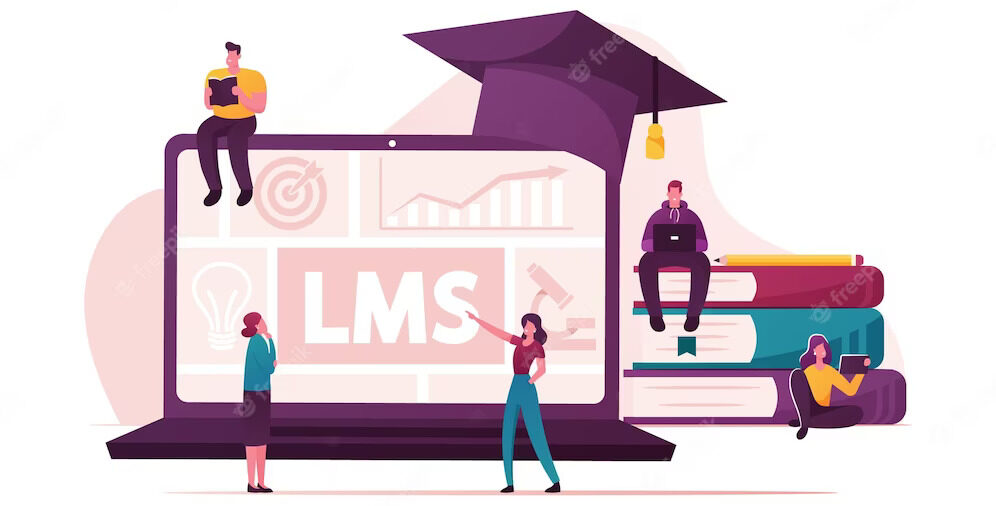Crafting Unique Learning Experiences: Custom LMS Development
- 1 Shortcomings of Standard LMS Platforms
- 1.1 User Experience and Interface Design:
- 1.2 Customization and Flexibility:
- 1.3 Scalability and Performance:
- 1.4 Integration Challenges:
- 1.5 Mobile Compatibility:
- 1.6 Data Privacy and Security:
- 1.7 Limited Analytics and Insights:
- 1.8 Innovative Pedagogical Approaches:
- 1.9 Communication and Collaboration Tools:
- 1.10 Cost and Licensing Issues:
- 2 Wezom’s Vision of Custom LMS Development
- 3 Conclusion
In today’s digital-centric educational landscape, Learning Management Systems (LMS) have emerged as essential tools for both academic institutions and businesses. While generic platforms offer a broad range of functionalities, there’s an increasing demand for more personalized solutions.
Standard Learning Management System (LMS) platforms have become integral tools in the modern educational landscape, facilitating the management, delivery, and tracking of online learning experiences. However, despite their utility, they are not without their shortcomings.
Shortcomings of Standard LMS Platforms
Here, we will delve into the detailed shortcomings of standard LMS platforms:
User Experience and Interface Design:
Standard LMS platforms often suffer from outdated user interfaces and poor user experience design. Navigating through these systems can be cumbersome and counterintuitive, leading to frustration among both educators and learners. In an era where sleek, user-friendly interfaces are the norm, the clunky designs of many LMS platforms hinder engagement and adoption.
Customization and Flexibility:
Most standard LMS platforms lack the level of customization needed to tailor the learning experience to the specific needs of an institution or individual instructor. This can limit the effectiveness of the platform in addressing unique learning goals and teaching methods. Educators often find themselves constrained by the rigid structure of these systems, inhibiting their ability to innovate and adapt.
Scalability and Performance:
Large-scale usage of standard LMS platforms can strain the system’s infrastructure, leading to performance issues such as slow load times, crashes, and unresponsive interfaces. As educational institutions grow in size and popularity, the LMS may struggle to handle the increased demand, negatively impacting the learning experience.
Integration Challenges:
Integrating standard LMS platforms with other tools and systems, such as content creation tools, video conferencing platforms, or third-party apps, can be problematic. Compatibility issues, data synchronization problems, and security concerns may arise, leading to a fragmented tech ecosystem that hampers efficient teaching and learning workflows.
Mobile Compatibility:
Many standard LMS platforms do not offer seamless mobile compatibility or dedicated mobile apps, despite the growing trend of learners accessing content on their smartphones and tablets. This lack of responsiveness to mobile devices can deter engagement and limit the accessibility of learning materials.
Data Privacy and Security:
Standard LMS platforms handle sensitive student and faculty data, which makes data privacy and security paramount. However, there have been instances of security breaches and data leaks in some LMS platforms. Ensuring robust security measures, compliance with data protection regulations, and secure data storage are ongoing challenges for these systems.
Limited Analytics and Insights:
While most LMS platforms offer basic analytics, they often fall short in providing deep insights into student performance and engagement patterns. Instructors and administrators may lack the comprehensive data needed to make informed decisions about instructional improvements, intervention strategies, and personalized learning pathways.
Innovative Pedagogical Approaches:
The design of many standard LMS platforms is rooted in traditional educational models, which can hinder the implementation of more innovative and student-centered pedagogical approaches. Features that support project-based learning, collaborative activities, and interactive assessments may be limited or poorly executed.
Communication and Collaboration Tools:
Communication and collaboration tools within standard LMS platforms are usually basic and lack the sophistication of dedicated communication platforms. Engaging in meaningful discussions, group projects, and real-time interactions can be challenging, limiting the development of important soft skills.
Cost and Licensing Issues:
Some standard LMS platforms come with hefty licensing fees that can strain the budgets of educational institutions, especially smaller ones. Moreover, the cost of ongoing maintenance, updates, and support can escalate over time, making it difficult for institutions to allocate resources effectively.
In conclusion, while standard LMS platforms offer valuable solutions for managing online learning, they suffer from several shortcomings that hinder their effectiveness and limit their potential to provide rich and engaging educational experiences. Addressing these issues requires a concerted effort from developers, educators, and institutions to create more flexible, user-friendly, and innovative learning management solutions.
Wezom’s Vision of Custom LMS Development
At the heart of Wezom’s custom LMS development approach is a deep understanding of an organization’s needs. By collaborating closely with clients, Wezom crafts LMS platforms that not only address specific challenges but also resonate with the organization’s ethos and vision.
Wezom’s custom-developed LMS platforms are designed with scalability in mind. As organizations expand and their training requirements evolve, the LMS can adapt seamlessly. Moreover, Wezom ensures that their solutions are equipped to integrate emerging technologies, making them future-proof and cutting-edge.
Prioritizing User Engagement and Experience
Wezom believes that a successful LMS is one that captivates its users. Through custom LMS development, they integrate features like gamified modules, interactive content, and personalized learning pathways, ensuring that users are deeply engaged and invested in their learning journey.
Conclusion
In the evolving world of digital education, custom LMS development stands as a testament to the power of personalization and innovation. With companies like Wezom at the helm, organizations can look forward to LMS platforms that are not just functional but also transformative. Embracing custom solutions is the key to crafting learning experiences that inspire, engage, and educate.

















